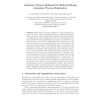Free Online Productivity Tools
i2Speak
i2Symbol
i2OCR
iTex2Img
iWeb2Print
iWeb2Shot
i2Type
iPdf2Split
iPdf2Merge
i2Bopomofo
i2Arabic
i2Style
i2Image
i2PDF
iLatex2Rtf
Sci2ools
162
Voted
ESSMAC
2003
Springer
2003
Springer
Analysis of Some Methods for Reduced Rank Gaussian Process Regression
Abstract. While there is strong motivation for using Gaussian Processes (GPs) due to their excellent performance in regression and classification problems, their computational complexity makes them impractical when the size of the training set exceeds a few thousand cases. This has motivated the recent proliferation of a number of cost-effective approximations to GPs, both for classification and for regression. In this paper we analyze one popular approximation to GPs for regression: the reduced rank approximation. While generally GPs are equivalent to infinite linear models, we show that Reduced Rank Gaussian Processes (RRGPs) are equivalent to finite sparse linear models. We also introduce the concept of degenerate GPs and show that they correspond to inappropriate priors. We show how to modify the RRGP to prevent it from being degenerate at test time. Training RRGPs consists both in learning the covariance function hyperparameters and the support set. We propose a method for le...
| Added | 06 Jul 2010 |
| Updated | 06 Jul 2010 |
| Type | Conference |
| Year | 2003 |
| Where | ESSMAC |
| Authors | Joaquin Quiñonero Candela, Carl Edward Rasmussen |
Comments (0)

